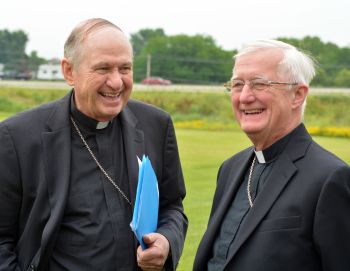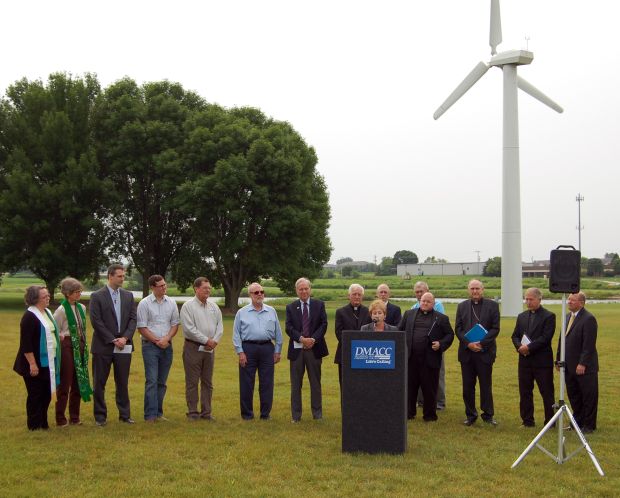DES MOINES, Iowa (CNS) — Iowa Catholic leaders, interfaith leaders, clean energy advocates and others encouraged Iowans to take action in light of Pope Francis’ historic encyclical on the environment, “Laudato Si’, on Care for Our Common Home.”
Des Moines Bishop Richard E. Pates encouraged Catholic Iowans to take advantage of the state’s first-in-the-nation role in the presidential electoral process to keep in mind the issue of caring for the environment as shared by Pope Francis in his encyclical as they talk with those who seek to lead the United States.
He invited all Iowans to conserve energy, use energy-efficient appliances, invest in renewable energy systems and talk with their local, state and national leaders, urging them to “exercise leadership in protecting the earth.”
[hotblock]
Bishop Pates encouraged all people to consider what role they can play in caring for God’s creation during a news conference July 2 in front of a wind turbine on the Ankeny campus of Des Moines Area Community College, where students learn job skills for employment in the clean energy industry.
“We are called to participate in public life and work for the common good,” he said. His remarks were delivered by Father David Fleming, vicar general, because the bishop had a throat ailment. “We will have presidential candidates visiting our state regularly in the coming months. We have a unique opportunity to keep the issue of climate change on the front burner.”
Davenport Bishop Martin J. Amos began the news conference with a prayer taken directly from the pope’s encyclical.
Pope Francis, in “Laudato Si’,” explained that human life is grounded and intertwined with God, each other and earth itself, said Father Robert “Bud” Grant, an environmental theologian and instructor at St. Ambrose University in Davenport. Climate change and overconsumption have created social, economic and spiritual consequences, he said.

Bishop Richard E. Pates of Des Moines, Iowa, and Bishop Martin J. Amos of Davenport, Iowa, talk before a July 2 news conference on clean energy in Ankeny, Iowa. (CNS photo/courtesy Diocese of Des Moines)
The world’s poor, who contribute the least to environmental problems, are bearing the heaviest consequences, said Father Grant.
Pope Francis “is absolutely adamant that climate change is real, it’s advanced and that we are causing it,” he said.
Every person on the planet is invited to work toward solutions, which will take “profound political courage.”
The encyclical, though, goes deeper than a political debate, he said.
“The pope uses the words ‘Democrat’ and ‘Republican’ exactly zero times” in the encyclical, said Father Grant. However, he does use the word “relationship” more than 100 times.
“It’s the most often used word in the encyclical other than those related to God, religion and the earth. He wants us to build relationships with the earth and with one another,” said Father Grant. “Fundamentally, this is about all human beings. It’s not about political debate. He thinks we need to get beyond that and buckle down and get to work” at finding solutions.
There is groundwork for an interfaith effort, said the Rev. Susan Guy, director of Iowa Interfaith Power and Light.
“All major faith traditions have a statement on caring for the earth or caring for creation and they all have something to say about caring for one another,” she said. “Climate change is an issue that impacts both the earth and all of us. It really is an issue that we’ve come together around.”
Extreme weather can be seen here in Iowa.
“In recent years, we’ve seen more volatile weather, more extreme events — unprecedented is the word — unprecedented in our lifetime: heat, drought and heavy rain and late snows and extreme cold in snow. We need to prepare and adapt for these extremes,” said southwest Iowa soybean farmer Ray Gaesser.
[hotblock2]
“We need to use practices that are successful along with new technologies to feed people and enhance our resources,” said Gaesser, a member of St. Patrick Parish in Lenox. “We should all work together because it’s the morally right thing to do.”
Change also can be seen in Iowa. It’s possible to care for the environment while encouraging economic growth. In Iowa, 28 percent of the energy Iowans use comes from the wind.
Local governments get taxable value in their communities, farmers gain income and utilities gain a stable supply of clean energy, said Kirk Kraft, who works for Iowa-based wind-farm developer RPMAccess.
“We’re living proof that doing the right thing environmentally an also be a very positive economic impact,” he said.
Ultimately, “Laudato Si'” is a teaching document of hope, said Lonnie Ellis, associate director of the Catholic Climate Covenant. “The pope, with a huge smile on his face, is saying we can do this. We can have a better relationship with the Creator. We can protect our children” and find economic opportunity while protecting the environment.
***
Cox is editor of The Catholic Mirror, newspaper of the Diocese of Des Moines.
PREVIOUS: Key to peace, justice is kinship, Jesuit priest tells fellow clergy
NEXT: Advocates urge continued funding of adult stem-cell research, treatment



I agree with D.Guidotti. This is frightening when we have so many moral & political issues such as terrorism and the persecution of Christians in the world. Sounds like they are taking easy issues over more serious ones.
This just highlights how out of touch many American Bishops are with their moral priorities. To pick a future and mostly secular utopian vision like the environment, ahead of real and current religious problems and intrinsic evils that are affecting the American Catholic Church right now, is a disorientation so great that it borders on the delusional. It is plain nonsense and sadly these Bishops should know better.